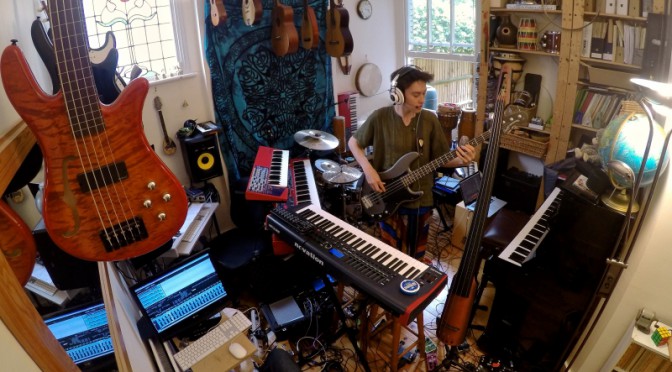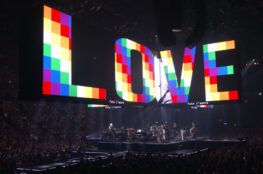I recently came a cross this amazing talent in a newsletter email highlighting an upcoming Quincy Jones’ concert with Mr Collier accompanied by raving endorsements by Jones and other top jazz performers of our time such as Pat Metheny, Herbie Hancock and Chick Corea. The introduction of this rising star mentioned that he’s a successful YouTuber so naturally I looked him up. And here’s what I came across first.
That really blew my mind! It’s easy to hear why he’s received such praise. Not only does young Mr Collier has some very interesting and fresh sounding harmonic, melodic and rhythmic ideas but he’s also found his own way of expressing them – his performance style, if you will. And listen to the way he builds up this old classic first with rather traditional, although extended, harmonies and (more) conventional rhythms and saving his more unique ideas later on in the performance. I.e. he doesn’t go straight for the “acrobatics”, but first bows to the tradition before springing from it to his own adventurous exploration of the song.
In this age of fast flying YouTube stars and child prodigies Mr Collier shows not only musical maturity – at the age of 19 – but he’s put considerable effort and thought into his presentation. His videos are very well produced with fine audio and video quality and skilful editing. He even creates slightly different personages for the many “Jacobs” singing the multiple parts. They each have a unique attire and different hairstyle (although, frankly, he’s not much of a stylist 😉 ). What I especially like is that he moves his head in rhythm with the particular voice he’s singing making it easier for the listener to recognise which of the Jacobs is singing which part.
Technology and/in performance
After my university studies I was sketching a plan for a PhD research on music and technology, especially in the ways various technologies are used in live music performance. Collier seems to be interested in this topic as well and searching for technological means to express his musical ideas.
I recommend listening to this one with heaphones or well positioned speakers to experience the live mixing.
What I find especially intriguing in this video that Collier actually demonstrates us what DJs do when they mix records and samples and manipulate them live. Only Collier produces all the “samples” himself, live. In an interview he has indeed mentioned that honing his performance solo practices is one of is major goals. For this end he’s already got a project with MIT lined up. I’m very curious to hear and see the fruits of that endeavour!
In the above interview Collier makes an interesting comment about his predilection to acoustic piano against various keyboards and synthesisers. That’s an approach of a musician as a craftsman in the traditional sense. Playing acoustic instruments gives one a whole different sense of “doing” and control of the sounds one produces. Getting the desired sound(s) out of an acoustic instrument also requires sufficient technical command on it. On a keyboard, synthesiser, or some other “post-mechanical” instrument, the sound is much more – if not entirely – predetermined and the player merely triggers it with a press of a key or hitting the electric drum. Of course technique is still required to make music with such instruments but more towards executing than producing the music.
Collier’s choices of instruments are eclectic and apparently arise from his upbringing in a family of musicians and abundant and varied musical activities from an early age (see the interview linked to above). He has a particular preference to melodica, an instrument originally designed for educational use. In Collier’s hands this simple instrument doesn’t seem to lack anything but is able to rise for the musical occasion at hand. Outside his music room he also makes use of its portability and e.g. joins the horn section of Snarky Puppy and walks to the soloist’s mic to take his solo in the manner of horn players.
Talent in the Internet age
As mentioned above, Jacob Collier really stands out among the YouTube child prodigies playing e.g. classical piano, guitar or conducting an orchestra at a young age. While this comparison might be a bit far fetched as Mr Collier is not a child any more, there’s a similarity with the immense concentration of talent around a person (Anakin Skywalker anyone? 😉 ).
Significance of the medium in which we get these talents presented to us is also not to be neglected. While the YouTube stardom of most of the above mentioned young talents doesn’t reach the “Internet Phenomenon” stage, with Mr Collier it not only does reach it but delving into his world through the available clips makes quickly apparent that he already has a vision of his career that won’t allow his star to descend any time soon. At least that’s what I sincerely wish for him and am eager to witness in the years and, with all likelihood, decades to come.
|
Mixer 2
|
Actually Collier’s undertakings remind me of Prince in many ways. Prince has also always (or at least mostly) played all the instruments except horns on his records. But in fact also on the business side. In the 90s Prince infamously quarrelled with his record label at the time Warner Brothers about the ownership of his master records and began sporting a “Slave” text written on his face and changed his name to an “unpronounceable symbol” – all acts with multiple meanings as well as causing headaches to his record label trying to promote the brand formerly known as Prince.
Prince is attributed to have been one of the first artists to realise the power of internet in music business, which Collier seems to have mastered quite well. In addition to his YouTube channel, which having over 44 000 subscribers (at the time of writing this) probably brings him more than pocket money in Google Adds compensations, Collier has also launched crowd sourcing project on Patreon. I’d say he’s at least got his tuition fees at the Royal Academy of Music covered and he’s still left with some to maintain his sizeable instrument collection 🙂
Another thing about talent I’d like to bring up is the “nature-nurture” aspect of it. Statements about talented people like “It’s in his/her genes” are common enough implying that the talent is inherited. Coming from a musical family, this seems to fit the bill in Collier’s case. It is, however, a fact of biology that learned traits are not simply passed on. We can’t change our genes by learning new stuff and expect our offspring to get that “in the mother’s milk”. Species evolution takes place on the gene level due to (significant) changes in the living environment causing some genes to mutate. And this doesn’t happen in a generation or two of e.g. musicality in the family.
For more about human musicality check this short and concise presentation by Professor Henkjan Honing.
While “everyone is musical” to an extent as Professor Honing has shown [English translation of his book Iedereen is muzikaal], this musicality is of a different kind than what we witness in Collier. His musical family does have everything to do with it but not in a way of “passing on” the family trait in their genes. Rather, musical families support each other should there be interest in pursuing musical activities. Such interest is apparent in Collier and the support of his family has enabled him to reach a level of musical maturity in a young age (Check out also the bass player Victor Wooten‘s an multi-instrumentalist Usman Riaz‘s similar stories). What we hear in Collier’s undertakings is not merely talent but passion and drive to put the countless hours into practising and working on his music required to reach this level. And he just seems to be getting started so I’m really looking forward to follow his musical adventures to come 😀
And to wrap up here’s one more gem from Jacob Collier.







